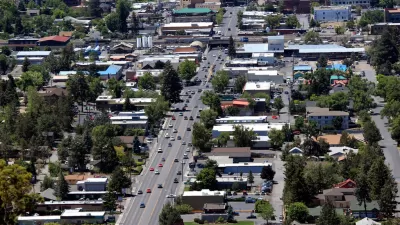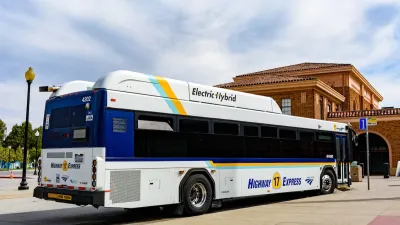Pricing road use by vehicle miles traveled (VMT) with higher fees for using congested roads could reduce travel time, claim researchers at Brookings.
"For decades, congestion has been trapping more people in their cars. From 2000 to 2005 the annual delay per traveler in the Washington area rose by a whole workday, to second worst in the nation. At the same time, highway and transit modernization is seriously underfunded. The federal gas tax - the primary source of revenue - is not indexed to inflation and has not increased since 1993. And states are reluctant to raise their gas taxes. With more fuel-efficient vehicles, revenues fell even as vehicle miles rose.
A better solution that would address both the congestion and financing problem would be road-use pricing that varies with congestion. Drivers would directly pay for the costs they impose on others. These charges would vary with VMT, the level of congestion, and the type of vehicle. The Congressional Budget Office recently confirmed that such pricing would reduce congestion, result in shorter and more reliable travel times, and enable governments to make more efficient infrastructure investments.
Road-use pricing is not a new idea, but it is gaining popularity as congestion increases, funding decreases and technological advances make implementation easier. However, two strong arguments against road-use pricing must be addressed, especially if differential charges are high enough to reduce congestion significantly."
FULL STORY: Road-use Fees Could Solve Our Transit Woes

Manufactured Crisis: Losing the Nation’s Largest Source of Unsubsidized Affordable Housing
Manufactured housing communities have long been an affordable housing option for millions of people living in the U.S., but that affordability is disappearing rapidly. How did we get here?

Americans May Be Stuck — But Why?
Americans are moving a lot less than they once did, and that is a problem. While Yoni Applebaum, in his highly-publicized article Stuck, gets the reasons badly wrong, it's still important to ask: why are we moving so much less than before?

Research Shows More Roads = More Driving
A national study shows, once again, that increasing road supply induces additional vehicle travel, particularly over the long run.

Judge Halts Enforcement of Anti-Homeless Laws in Grants Pass
The Oregon city will be barred from enforcing two ordinances that prosecute unhoused residents until it increases capacity and accessibility at designated camping sites.

Advancing Sustainability in Los Angeles County Schools
The Los Angeles County Office of Education’s Green Schools Symposium brings together educators, students, and experts to advance sustainability in schools through innovative design, climate resilience strategies, and collaborative learning.

Using Old Oil and Gas Wells for Green Energy Storage
Penn State researchers have found that repurposing abandoned oil and gas wells for geothermal-assisted compressed-air energy storage can boost efficiency, reduce environmental risks, and support clean energy and job transitions.
Urban Design for Planners 1: Software Tools
This six-course series explores essential urban design concepts using open source software and equips planners with the tools they need to participate fully in the urban design process.
Planning for Universal Design
Learn the tools for implementing Universal Design in planning regulations.
City of Moreno Valley
Institute for Housing and Urban Development Studies (IHS)
City of Grandview
Harvard GSD Executive Education
NYU Wagner Graduate School of Public Service
City of Cambridge, Maryland
Newport County Development Council: Connect Greater Newport




























